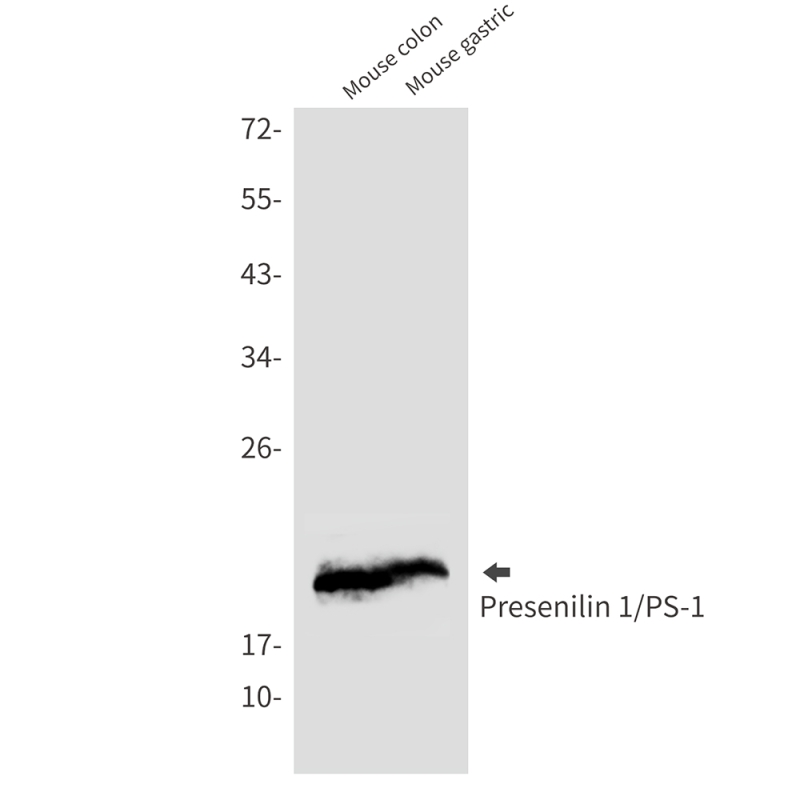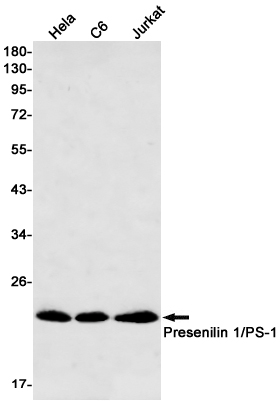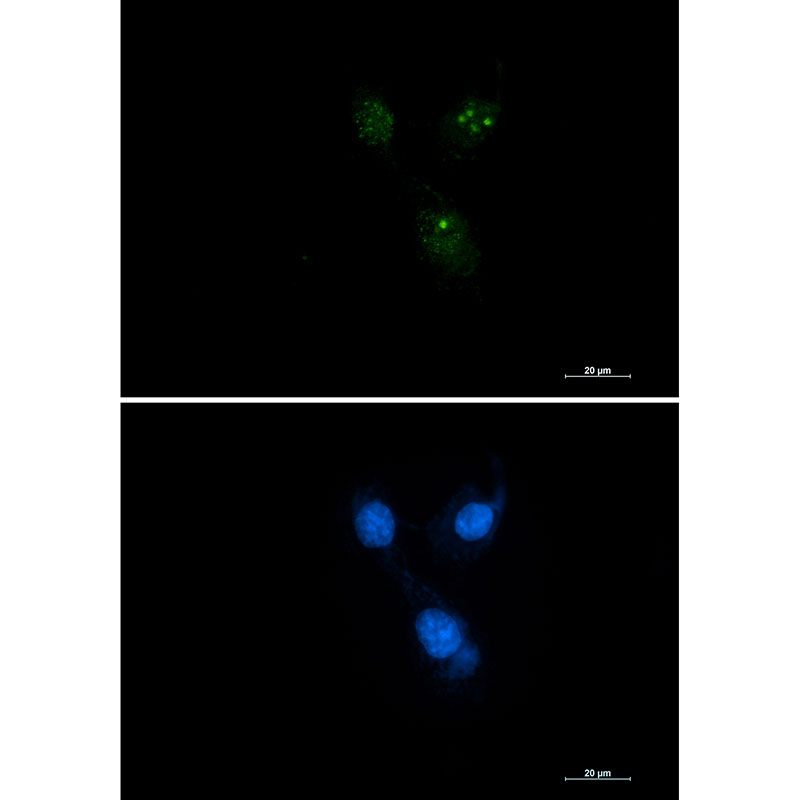


| WB | 1/500-1/1000 | Human,Mouse,Rat |
| IF | 1/20 | Human,Mouse,Rat |
| IHC | 咨询技术 | Human,Mouse,Rat |
| ICC | 1/50-1/200 | Human,Mouse,Rat |
| FCM | 咨询技术 | Human,Mouse,Rat |
| Elisa | 咨询技术 | Human,Mouse,Rat |
| Aliases | PSEN1; AD3; PS1; PSNL1; Presenilin-1; PS-1; Protein S182 |
| Entrez GeneID | 5663 |
| WB Predicted band size | Calculated MW: 53 kDa; Observed MW: 20 kDa |
| Host/Isotype | Rabbit IgG |
| Antibody Type | Primary antibody |
| Storage | Store at 4°C short term. Aliquot and store at -20°C long term. Avoid freeze/thaw cycles. |
| Species Reactivity | Human,Mouse,Rat |
| Immunogen | A synthetic peptide of human Presenilin 1 |
| Formulation | Purified antibody in TBS with 0.05% sodium azide,0.05%BSA and 50% glycerol. |
+ +
以下是关于Presenilin 1抗体的3篇参考文献及其摘要概括:
1. **文献名称**:*Familial Alzheimer's disease-linked presenilin 1 variants elevate Aβ1-42/1-40 ratio in vitro and in vivo*
**作者**:Duff, K. et al.
**摘要**:该研究通过表达突变型PSEN1的细胞模型和小鼠模型,利用特异性抗体检测Aβ42/40比例变化,证实PSEN1突变导致淀粉样蛋白加工异常,为阿尔茨海默病机制提供关键证据。文中验证了抗体在Western blot和免疫组化中的应用。
2. **文献名称**:*Endoproteolysis of presenilin 1 and accumulation of processed derivatives in vivo*
**作者**:Thinakaran, G. et al.
**摘要**:研究报道PSEN1蛋白在体内被切割为N端和C端片段,通过单克隆抗体识别不同片段,揭示其亚细胞定位及与γ-分泌酶复合体的相互作用,为后续功能研究奠定基础。
3. **文献名称**:*Comparative analysis of presenilin-1 antibodies for studying Alzheimer's disease pathogenesis*
**作者**:Kimberly, W.T. et al.
**摘要**:文章系统比较了多种商业化PSEN1抗体的特异性,通过敲除细胞系验证抗体可靠性,并推荐适用于免疫沉淀、Western blot等场景的优选抗体,为实验设计提供参考。
这些文献涵盖了抗体在机制研究、蛋白加工分析和抗体特异性验证中的关键应用。如需更多近期研究,可补充2020年后发表的抗体开发或新技术应用论文。
Presenilin 1 (PSEN1) is a transmembrane protein primarily known for its role as the catalytic subunit of the γ-secretase complex, which cleaves numerous transmembrane proteins, including amyloid precursor protein (APP). Cleavage of APP by γ-secretase generates amyloid-beta (Aβ) peptides, particularly Aβ42. whose accumulation in the brain is a hallmark of Alzheimer’s disease (AD). Mutations in the PSEN1 gene are the most common cause of early-onset familial AD, altering γ-secretase activity to favor production of pathogenic Aβ species.
PSEN1 antibodies are critical tools for studying its expression, localization, and function in both physiological and pathological contexts. These antibodies target specific epitopes, such as the N-terminal, C-terminal, or hydrophilic loop domains of PSEN1. enabling applications like Western blotting, immunohistochemistry, and immunoprecipitation. Researchers use PSEN1 antibodies to investigate protein-protein interactions within the γ-secretase complex, assess PSEN1 levels in AD models, or identify pathological mutations.
Additionally, PSEN1 antibodies contribute to diagnostic research by detecting abnormal PSEN1 expression in patient-derived cells or tissues. Their specificity is crucial, as PSEN1 shares structural homology with Presenilin 2 (PSEN2), requiring careful validation to avoid cross-reactivity. Understanding PSEN1's role through antibody-based studies has advanced insights into AD mechanisms and therapeutic strategies targeting γ-secretase activity or Aβ pathology.
×